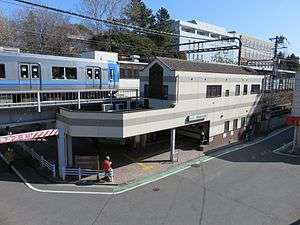Komaba-tōdaimae Station
Komaba-tōdaimae Station (駒場東大前駅, Komaba-tōdaimae eki) is a railway station on the Keio Inokashira Line in Komaba, Meguro, Tokyo, Japan, operated by the private railway operator Keio Corporation.
Komaba-tōdaimae Station 駒場東大前駅 | |
|---|---|
 Komaba-tōdaimae Station, West Exit | |
| Location | Meguro, Tokyo Japan |
| Operated by | Keio Corporation |
| Line(s) | Keio Inokashira Line |
| Other information | |
| Station code | IN03 |
| History | |
| Opened | 1965 |
| Traffic | |
| Passengers (FY2011) | 39,297 daily |
The station's name is a combination of Komaba, the name of the suburb in which it is located, and Todai-mae - which means "in front of University of Tokyo".
Lines
Komaba-tōdaimae Station is served by the 12.7 km Keio Inokashira Line from Shibuya in Tokyo to Kichijōji. Located between Shinsen and Ikenoue, it is 1.4 km from the Shibuya terminus.[1]
Service pattern
Only all-stations "Local" services stop at this station.
Station layout
There are two main exits from the station, East and West. The East Exit is close to the main entrance to the Komaba campus of the University of Tokyo, and to the central part of Komaba. The West Exit leads to Komaba 2, 3, and 4 chōme.
The station has one island platform, serving two tracks.[2] Because the station is located on a slope, on the western end, toward Kichijoji, it is effectively an elevated station; the eastern end is an ordinary ground-level platform. The ticket gate at the western entrance is located on ground level, below the level of the platform, and the gate at eastern gate is located in an above-track station building, higher than the platforms.
There is an elevator between the platform and ground-level at the western entrance.
Platforms
| 1 | ■ Keio Inokashira Line | for Shimo-Kitazawa, Meidaimae, and Kichijōji |
| 2 | ■ Keio Inokashira Line | for Shibuya |
Adjacent stations
| « | Service | » | ||
|---|---|---|---|---|
| Keio Inokashira Line (IN03) | ||||
| Shinsen (IN02) | Local | Ikenoue (IN04) | ||
| Express: Does not stop at this station | ||||
History
The station opened on 11 July 1965.[1]
From 22 February 2013, station numbering was introduced on Keio lines, with Komaba-tōdaimae Station becoming "IN03".[3]
Passenger statistics
In fiscal 2013, the station was used by an average of 39,813 passengers daily.[4]
The passenger figures for previous years are as shown below.
| Fiscal year | Daily average |
|---|---|
| 1999 | 35,524[1] |
| 2010 | 40,024[4] |
| 2011 | 39,297[4] |
| 2012 | 39,119[4] |
| 2013 | 39,813[4] |
Surrounding area
- University of Tokyo, Komaba Campus
- National Center for University Entrance Examinations
- Japanese Folk Crafts Museum
- Komaba Park
References
- Terada, Hirokazu (July 2002). データブック日本の私鉄 [Databook: Japan's Private Railways]. Japan: Neko Publishing. p. 205. ISBN 4-87366-874-3.
- Kawashima, Ryozo (April 2010). 日本の鉄道 中部ライン 全線・全駅・全配線 第1巻 東京駅―三鷹エリア [Railways of Japan - Chubu Line - Lines/Stations/Track plans - Vol 1 Tokyo Station - Mitaka Area]. Japan: Kodansha. pp. 10, 52. ISBN 978-4-06-270061-0.
- 京王線・井の頭線全駅で「駅ナンバリング」を導入します。 [Station numbering to be introduced on Keio Line and Inokashira Line] (PDF). News release (in Japanese). Keio Corporation. 18 January 2013. Retrieved 23 February 2013.
- 1日の駅別乗降人員 [Average daily station usage figures] (in Japanese). Japan: Keio Corporation. 2013. Retrieved 23 February 2013.
External links
| Wikimedia Commons has media related to Komaba-Tōdaimae Station. |
- Komaba-tōdaimae Station information (Keio) (in Japanese)